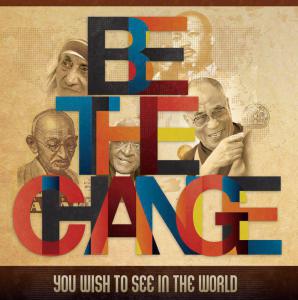“There is no such thing as Gandhism.”
by M. K. Gandhi
Editor’s Preface: In our continuing series on original texts, we are posting here Gandhi’s little known rejection of “Gandhism”. The editorial notes at the end give textual and other details. JG
There is no such thing as Gandhism, and I do not want to leave any sect after me. I do not claim to have originated any new principle or doctrine. I have simply tried in my own way to apply the eternal truths to our daily life and problems. There is therefore no question of my leaving any code behind like the code of Manu [an ancient Hindu Lawgiver]. There cannot be any comparison between that lawgiver and me. The opinions I have formed and the conclusions I have arrived at are not by any means final. I may change them tomorrow if I find better ones.
I have nothing new to teach the world. Truth and nonviolence are as old as the hills. All I have done is to try experiments in both, on as vast a scale and as best as I could. In doing so I have sometimes erred and learnt by my errors. Life and its problems have thus become to me a series of experiments in the practice of truth and nonviolence. By instinct I have been truthful, but not necessarily nonviolent. As a Jain Muni [Jain holy man] once rightly said, I was not so much a votary of Ahimsa as I was of Truth, and that I put the latter in the first place and the former in the second. For, as he phrased it, I was capable of sacrificing nonviolence for the sake of truth. In fact, it was in the course of my pursuit of Truth that I discovered Nonviolence. Our scriptures have declared that there is no Dharma [law] higher than truth. But nonviolence they say is the highest duty. The word Dharma, in my opinion, has a different connotation as used in the two aphorisms.
How am I to convince the world merely through books that my entire constructive programme is rooted in and based on the practice of nonviolence?
Well, my entire philosophy, if it may be called by that pretentious name, is contained in what I have just said. You will not call it Gandhism, for there is no “ism” about it. And no elaborate literature or propaganda is needed to explain it. The scriptures have been quoted against my postulation, but I have held faster than ever to my firm conviction that truth ought not to be sacrificed for anything whatsoever. Those who believe in the elementary truths I have laid down can propagate them only by living them. How am I to convince the world merely through books that my entire constructive programme is rooted in and based on the practice of nonviolence?
Only my life can demonstrate it.
A NOTE ON THE TEXT: This statement was made by Gandhi in an address to the Gandhi Seva Sangh on March 28, 1936, and is available from various sources, including Gandhi’s Collected Works. The most accurate text recorded is, however, the one we have used and is from SLADE, Madeleine. The Spirit’s Pilgrimage (Foreword by Vincent Sheehan), New York: Coward-McCann, 1960; pp. 200-201.
EDITOR’S NOTE: Madeleine Slade was given the name Mira Behn by Gandhi, by which she is generally known. Her autobiography cited above is one of the better accounts of Gandhi. Concerning Gandhi’s rejection of Gandhism, Slade also writes, “The Gandhi Seva Sangh (Gandhi Service Society) wanted to systematize and develop Bapu’s [Gandhi’s] ideals, and Bapu maintained that he had no ‘ism’ to be so handled. This resulted in one of the most valuable utterances that Bapu ever made about himself and his work.” (p. 200)





